英语为落实教研室评价方法的实施方案
英语教研室工作计划6篇

英语教研室工作计划6篇(经典版)编制人:__________________审核人:__________________审批人:__________________编制单位:__________________编制时间:____年____月____日序言下载提示:该文档是本店铺精心编制而成的,希望大家下载后,能够帮助大家解决实际问题。
文档下载后可定制修改,请根据实际需要进行调整和使用,谢谢!并且,本店铺为大家提供各种类型的经典范文,如总结报告、心得体会、讲话致辞、条据文书、合同协议、策划方案、规章制度、教学资料、作文大全、其他范文等等,想了解不同范文格式和写法,敬请关注!Download tips: This document is carefully compiled by this editor. I hope that after you download it, it can help you solve practical problems. The document can be customized and modified after downloading, please adjust and use it according to actual needs, thank you!Moreover, our store provides various types of classic sample essays, such as summary reports, insights, speeches, written documents, contract agreements, planning plans, rules and regulations, teaching materials, complete essays, and other sample essays. If you want to learn about different sample formats and writing methods, please pay attention!英语教研室工作计划6篇有了工作计划,我们可以更好地组织和安排工作任务,通过制定工作计划,我们可以更好地评估和反思自己的工作表现,不断改进和提升自己,以下是本店铺精心为您推荐的英语教研室工作计划6篇,供大家参考。
初中英语有效课堂教学评价研究策略

初中英语有效课堂教学评价研究策略导言初中英语教学是中学教育的重要组成部分,对学生的语言能力和综合素质的培养起着至关重要的作用。
而有效的课堂教学评价是促进学生学习、提高教学质量的重要手段。
本文旨在探讨初中英语有效课堂教学评价的研究策略,以期提高教学质量,促进学生全面发展。
一、教学目标明确教学目标是教学的出发点和落脚点,通过评价教学目标的实现情况,可以有效地反映教学效果。
在进行课堂教学评价时,首先需要明确教学目标,确定学生需要掌握的知识、能力和素质,使之成为课堂教学的核心。
1. 确定教学目标就初中英语教学而言,教学目标包括语言知识、语言能力和语言素养三个方面。
语言知识是语言的基础,包括词汇、语法、听力、口语、阅读、写作等;语言能力是运用语言的能力,包括听说读写的能力;语言素养是语感、文化意识、跨文化交际能力等。
明确这些教学目标,有助于对教学评价的方向和重点进行把握。
2. 落实教学目标明确教学目标之后,要求教师根据学生的实际情况,确定教学重点和难点,确保教学目标的落实。
这就要求教师根据学生的实际水平,灵活地调整教学内容和教学重点,提高教学的针对性和有效性,为课堂教学评价的准确性提供保障。
二、评价手段多样初中英语教学评价的多样化是促进学生全面发展的重要手段。
通过采用不同的评价手段,可以全面、客观地评价学生的学习情况和教学效果,有利于促进学生的学习兴趣,提高他们的学习效果。
1. 笔头测试笔头测试是最常用的评价手段之一,包括选择题、填空题、翻译题、作文等。
通过这些形式的测试,可以全面地评价学生的词汇量、语法掌握情况、阅读能力、写作能力等,为教学评价提供量化的数据支持。
2. 口头测试口头测试是评价学生口语交际能力和听力理解能力的重要手段,包括综合口试、小组讨论、听力测试等。
通过这些形式的测试,可以有效地评价学生的口语表达和听力理解情况,为教学评价提供真实的语言运用情景。
3. 作业评价作业评价是教学过程中不可或缺的一环,通过布置不同形式的作业,可以有效地检验学生的课后复习和自主学习情况,为教学评价提供学生的实际学习水平和教学效果。
英语教育教学评价改革实施方案

英语教育教学评价改革实施方案一、需求分析1.1 教育教学评价的背景和意义近年来,随着教育教学模式的变革和发展,对于评价教学效果的要求也日益提高。
传统的教育教学评价方式存在着单一、片面、机械化的问题,不能准确反映学生的综合能力和素质发展。
因此,改革教育教学评价已成为全面提高教育教学质量的必要举措。
1.2 教育教学评价改革的目标- 培养学生的综合能力和素质发展;- 促进教育教学质量的提升;- 建立科学、公正、有效的评价体系。
二、改革原则2.1 追求科学合理性教育教学评价应基于教育教学的科学理论和方法,以科学、客观、准确的数据为依据,确保评价结果的准确性和公正性。
2.2 尊重个体差异性学生是有差异性的,应尊重每个学生的个体差异,注重评价的多样性和个性化,以更好地了解学生的优势和需求,为个体发展提供有针对性的指导。
2.3 坚持过程导向评价应关注学生的学习过程,注重对学生的学习过程和学习策略进行观察和评价,以便更好地指导学生的学习方法和策略。
2.4 建立多元化的评价方式评价方式应多样化,包括考试评价、作业评价、课堂参与评价、实践评价等,全面了解学生的学习状况和能力发展。
三、改革内容和措施3.1 设计科学合理的评价指标体系制定明确的评价指标,包括知识技能、创新思维、综合能力等方面的评价内容,以全面评价学生的学习情况。
3.2 推行多样化的评价方式进行多种评价方式的探索和尝试,如考试评价、作业评价、课堂参与评价、实践评价等,以适应不同学习需求和特点的学生。
3.3 引入综合评价方法综合评价包括评语、自评、互评等方式,旨在增强学生的自主性和学习动力,帮助学生更好地发现自身的优势和不足。
3.4 鼓励教师进行教学改革教学评价改革需要教师积极参与,鼓励教师采用创新的教学方法和策略,为学生学习和发展提供更有价值的评价指导。
四、改革实施和评估4.1 推进改革实施- 制定具体的实施方案和时间表;- 培训教师,提高他们的评价能力;- 搜集学生和家长的意见,并做出适当调整。
初中英语教研评价案例(3篇)

第1篇一、案例背景随着我国教育改革的深入推进,英语教育在初中阶段的重要性日益凸显。
为了提高初中英语教学质量,我校英语教研组积极开展教研活动,旨在通过集体备课、课堂观摩、教学反思等方式,提升教师的专业素养和教学水平。
本文以我校英语教研组的一次教研评价活动为例,探讨如何通过教研评价促进教师专业发展。
二、案例描述1. 研究主题本次教研评价的主题为“提高初中英语课堂教学效率”。
2. 研究对象我校英语教研组全体教师。
3. 研究方法(1)课堂观摩:教研组成员共同观摩一节英语课,观察教师的教学方法、学生参与度、课堂氛围等方面。
(2)教学反思:教师根据课堂观摩情况,结合自身教学实践,进行教学反思。
(3)问卷调查:对全体学生进行问卷调查,了解学生对英语课堂的满意度。
4. 研究过程(1)课堂观摩教研组成员共同观摩了我校一位年轻教师的英语课。
在观摩过程中,教师注重激发学生的学习兴趣,运用多种教学方法,如小组合作、角色扮演等,使课堂氛围活跃。
同时,教师关注学生的学习进度,及时调整教学策略。
(2)教学反思观摩课后,教研组成员对课堂进行了深入讨论。
大家一致认为,教师的教学方法值得借鉴,但在以下几个方面仍有提升空间:①课堂导入环节可以更加新颖,吸引学生注意力。
②课堂互动环节可以增加,提高学生的参与度。
③课后作业布置应多样化,满足不同学生的学习需求。
(3)问卷调查针对全体学生,我们开展了问卷调查。
调查结果显示,学生对英语课堂的满意度较高,但在以下方面仍有改进空间:①部分学生反映课堂氛围较为紧张,希望教师能够更加轻松地与学生互动。
②部分学生认为课后作业量较大,希望教师能够适当调整。
5. 研究结果通过本次教研评价,我们发现:(1)教师的教学方法基本符合新课程理念,但在课堂导入、互动环节等方面仍有改进空间。
(2)学生对英语课堂的满意度较高,但在课堂氛围、作业量等方面仍有改进空间。
6. 改进措施(1)教师应注重课堂导入环节,采用新颖的教学方法,激发学生的学习兴趣。
英语教研工作计划15篇

英语教研工作计划15篇英语教研工作计划1一、指导思想:全面贯彻党的教育方针,认真学习先进的教育理论和新的课程标准,积极投身课程改革,坚定不移地实施以培养学生创新意识、探索意识和实践能力为重心的素质教育,以更新观念为前提,以育人为归宿,以提高教师素质为核心,以提高课堂教学效率为重点。
转变教研理念,改进教研方法,优化教研模式,积极探索在新课程改革背景下的教研工作新体系。
二、主要工作与措施(一)组织业务学习。
本学期我组将学习《英语课程标准》、学校有关规定、要求,组织全组教师认真参与各级各类的培训和讲座。
进一步学习课程改革的理念,认真向兄弟学校学习,努力对新教材有一个认识,切实转变教学理念。
引导教师确立“终身学习”“团体学习”等观念,把工作与学习结合起来,做到“工作学习化”、“学习工作化”。
努力营造良好的学习氛围;引导教师把学习与研究、思考有机结合起来,边学习,边思考,边研究,切实提高业务水平,提升教学理念。
(二)、发挥教研群体作用。
积极开展学校教研组活动,做到教研活动经常化、专题化和系列化。
做到教研与科研相结合,新的理念与课堂教学相结合,培训教师与教研活动相结合。
1、教研活动经常化。
根据教研组的具体情况制订切实有效的实施措施,教研活动的重点应该放在课堂教学。
以有效教学为教研的核心,严格按照教务处的规定,人人参与教研公开课活动,本学期计划组内各任课教师开研讨课一节,上岗未满三年的教师开2节。
要求开课教师积极准备,课后听课教师积极参与研讨。
开课教师要上交开课教案由教研组存档。
2、教研活动专题化。
针对教研组的具体问题,善于发现教学实际中的薄弱环节,研讨在实际教学中的解决办法,集思广益、交流探讨,促使广大参与教师有所收获。
如在教学过程中,以有效教学为中心,积极准备教学资料,编制符合学生实际的练习,做到有练必批,有错必改。
在复习阶段,要搞好复习计划和研讨,以提高学生成绩。
3、教研活动系列化。
有系列地开展活动,如围绕某个专题组织理论学习,也可以是以年级为单位进行的集体备课,尽管平行班任课老师均只有两名,但集体备课仍要确保实效,注意发挥每个教师的智慧,也唯有此,才能使更多的教师有参与的机会、锻炼的机会,真正把教研活动与提高课堂教学效率结合起来,与解决实际问题结合起来,与教师成长结合起来。
《小学英语课堂教学评价方式的研究》课题研究方案[方案]
![《小学英语课堂教学评价方式的研究》课题研究方案[方案]](https://img.taocdn.com/s3/m/b3ad54dfba1aa8114531d949.png)
《小学英语课堂教学评价方式的研究》课题研究方案[方案] 《小学英语课堂教学评价方式的研究》课题研究方案一、课题名称:小学英语课堂教学评价方式的研究二、课题的提出(背景)小学英语课程在我县已经实施几个年头了,随着小学英语不断发展和壮大,迫切需要一些理论性的指导,以便更好地进行实践活动,提高教学质量,突出特色。
课题项目的研究,是促进学生发展的需要,是教师专业发展的需要,也是各个学校发展的需要;是实现课程目标,促进课程发展的有效途径和重要保障;也是促进学生健康成长,教师素质全面提升,学校管理更加科学的有力保证。
根据当前的实际情况,学生学习的积极性和学习动力直接影响到学生的学习情况,怎样才能让学生对学习英语产生兴趣,积极主动地学习英语,这是英语工作者所面临的一个急待解决的问题。
按照新的课程理念,小学英语课堂教学评价应与教学融为一体,有利于促进教学,有利于学生的成长,应体现过程性和激励性。
但就小学英语课堂评价看,还存在着这样的问题:照搬中学英语的应试教育的评价方式;照搬其他学科陈旧的评价体系;评价形式重书面轻口语交际,评价内容重知识轻情感态度;只重视教师的评价,而忽视学生的自我评价和合作评价。
这些评价方式都违背了新课程标准的理念,违背了尊重教育的原则,尊重教育思想认为教育应该以学生为本,尊重学生的身心特点,成长和发展的特点,尊重他们的人格、权利和兴趣,保护学生的自尊心和自信心。
所以作为小学英语教师很有必要在实践中探索切实可行的小学英语课堂评价方式,把学生从被动接受评价转变成为评价的主体和参与者。
本课题就是通过多种方式的评价手段来激发学生的学习兴趣,保护学生的自尊心,培养学生敢于开口、积极参与的良好习惯,让学生积极主动的参与学习。
通过对课题的研究,让教师的教学观念能与时俱进,转变教学方式,把握课程标准,探索新型的专业发展道路,逐步掌握教学评价的理论和实施技能。
在研究和实践过程中,通过评价试验研究促进教学,归纳和总结出一些行之有效的方法和经验,探索并逐步建立科学的评价体系,改善学校英语教育环境,能有效地促进学生自主学习能力的发展,从而提高英语教学的质量和学生学习的质量。
英语评价方案

英语评价方案第1篇英语评价方案一、背景随着全球化的不断深入,英语作为国际通用语言的地位日益凸显。
在我国,掌握英语已成为一项重要的技能,有助于提升个人综合素质,拓宽国际视野。
为了更好地评估英语学习者的实际水平,制定一套科学、合理、人性化的英语评价方案显得尤为重要。
二、目标1. 建立全面、客观、公正的英语评价体系,确保评价结果具有权威性和可信度。
2. 激发英语学习者的学习兴趣,引导其正确对待英语学习,提高学习效果。
3. 促进英语教学质量的提升,为教育决策提供有力支持。
三、评价内容1. 听力:测试学习者对英语语音、语调、语速的理解能力,以及获取关键信息的能力。
2. 阅读:测试学习者对英语文章的理解、分析和评价能力,包括词汇、语法、句子结构等方面的掌握。
3. 口语:测试学习者的英语口头表达能力,包括语音、语调、流利程度以及交际策略的运用。
4. 写作:测试学习者的英语书面表达能力,包括词汇、语法、句子结构、逻辑性等方面的掌握。
四、评价方法1. 听力:采用线上或线下方式进行,包括短对话、长对话、短文理解和听写等题型。
2. 阅读:采用线上或线下方式进行,包括词汇理解、长篇阅读和阅读理解等题型。
3. 口语:采用线上或线下方式进行,设置情景对话、角色扮演、个人陈述等环节。
4. 写作:采用线上或线下方式进行,设置命题作文、图表作文、议论文等题型。
五、评价标准1. 听力:根据题目难度、语音清晰度、语速等因素,制定合理的评分标准。
2. 阅读:根据文章难度、词汇量、句子结构等因素,制定合理的评分标准。
3. 口语:根据发音、语调、流利程度、交际策略等因素,制定合理的评分标准。
4. 写作:根据内容、结构、语言运用、逻辑性等因素,制定合理的评分标准。
六、评价流程1. 制定评价方案:根据英语教学大纲和实际教学需求,制定评价方案。
2. 开展评价活动:按照评价方案,组织线上或线下评价活动。
3. 评分与反馈:采用人工或人工智能技术进行评分,为学习者提供详细、具体的反馈。
小学英语评价实施方案
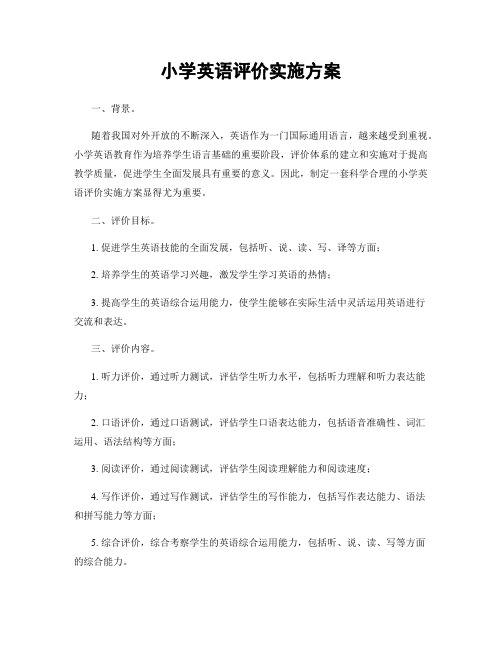
小学英语评价实施方案一、背景。
随着我国对外开放的不断深入,英语作为一门国际通用语言,越来越受到重视。
小学英语教育作为培养学生语言基础的重要阶段,评价体系的建立和实施对于提高教学质量,促进学生全面发展具有重要的意义。
因此,制定一套科学合理的小学英语评价实施方案显得尤为重要。
二、评价目标。
1. 促进学生英语技能的全面发展,包括听、说、读、写、译等方面;2. 培养学生的英语学习兴趣,激发学生学习英语的热情;3. 提高学生的英语综合运用能力,使学生能够在实际生活中灵活运用英语进行交流和表达。
三、评价内容。
1. 听力评价,通过听力测试,评估学生听力水平,包括听力理解和听力表达能力;2. 口语评价,通过口语测试,评估学生口语表达能力,包括语音准确性、词汇运用、语法结构等方面;3. 阅读评价,通过阅读测试,评估学生阅读理解能力和阅读速度;4. 写作评价,通过写作测试,评估学生的写作能力,包括写作表达能力、语法和拼写能力等方面;5. 综合评价,综合考察学生的英语综合运用能力,包括听、说、读、写等方面的综合能力。
四、评价方式。
1. 考试评价,定期组织英语考试,包括听力、口语、阅读和写作等部分;2. 作业评价,通过布置英语作业,评估学生的英语学习情况,包括书面作业和口头作业;3. 课堂评价,通过课堂表现,评估学生的学习态度、参与度和学习效果;4. 综合评价,通过学期末综合评价,综合考察学生的英语学习情况,包括学习成绩、学习态度、学习方法等方面。
五、评价标准。
1. 听力评价标准,包括听力理解能力和听力表达能力,根据听力材料的难易程度和学生的听力反应情况进行评分;2. 口语评价标准,包括语音准确性、词汇运用、语法结构等方面,根据学生口语表达的流利程度和准确性进行评分;3. 阅读评价标准,包括阅读理解能力和阅读速度,根据学生对阅读材料的理解程度和阅读速度进行评分;4. 写作评价标准,包括写作表达能力、语法和拼写能力等方面,根据学生的写作表达能力和语言运用能力进行评分;5. 综合评价标准,根据学生在听、说、读、写等方面的综合能力进行评价,综合考察学生的英语综合运用能力。
英语精准教研实施方案

英语精准教研实施方案As an author of Baidu Wenku document, I am pleased to present the implementation plan for precise English teaching and research.English teaching and research are crucial in today's education system. To ensure the effectiveness and precision of English teaching and research, a comprehensive implementation plan is necessary. This plan aims to provide a clear and practical guide for educators and researchers to enhance the quality of English education and research.Firstly, it is essential to establish clear learning objectives and research goals. This includes defining the specific language skills and knowledge that students should acquire, as well as identifying the research questions and objectives for English teaching and research. By setting clear goals, educators and researchers can focus on the most important aspects of English education and research, leading to more effective outcomes.Secondly, the implementation plan should emphasize the use of innovative teaching and research methods. This includes incorporating technology and multimedia resources into English teaching, as well as utilizing advanced research tools and methodologies. By embracing innovative approaches, educators and researchers can create a more dynamic and engaging learning environment, as well as conduct more in-depth and impactful research.Furthermore, the plan should highlight the importance of continuous assessment and evaluation. This includes regularly monitoring students' progress in English learning, as well as evaluating the effectiveness of research methods and outcomes. By continuously assessing and evaluating, educators and researchers can identify areas for improvement and make necessary adjustments to enhance the overall quality of English education and research.In addition, collaboration and communication should be prioritized in the implementation plan. This includes fostering collaboration among educators and researchers, as well as promoting communication between students and researchers. Byworking together and sharing insights, educators and researchers can benefit from diverse perspectives and experiences, leading to more comprehensive and impactful English education and research.Moreover, the implementation plan should advocate for professional development and training. This includes providing opportunities for educators and researchers to enhance their skills and knowledge in English teaching and research. By investing in professional development, educators and researchers can stay updated with the latest trends and best practices in English education and research, ultimately improving the overall quality of teaching and research.In conclusion, the implementation plan for precise English teaching and research is essential for enhancing the quality and effectiveness of English education and research. By establishing clear objectives, embracing innovative methods, prioritizing assessment and evaluation, promoting collaboration and communication, and investing in professional development, educators and researchers can create a more impactful and successful English teaching and research environment.。
有效评估初中英语课堂教案的实施效果有哪些方法?
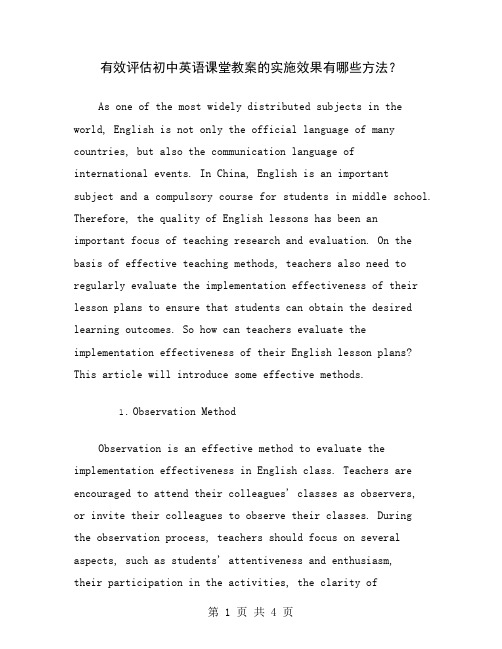
有效评估初中英语课堂教案的实施效果有哪些方法?As one of the most widely distributed subjects in the world, English is not only the official language of many countries, but also the communication language ofinternational events. In China, English is an importantsubject and a compulsory course for students in middle school. Therefore, the quality of English lessons has been animportant focus of teaching research and evaluation. On the basis of effective teaching methods, teachers also need to regularly evaluate the implementation effectiveness of their lesson plans to ensure that students can obtain the desired learning outcomes. So how can teachers evaluate the implementation effectiveness of their English lesson plans? This article will introduce some effective methods.1.Observation MethodObservation is an effective method to evaluate the implementation effectiveness in English class. Teachers are encouraged to attend their colleagues' classes as observers,or invite their colleagues to observe their classes. Duringthe observation process, teachers should focus on several aspects, such as students' attentiveness and enthusiasm,their participation in the activities, the clarity ofteacher's instruction, their pronunciation and intonation and so on. After the observation, teachers should provide feedback to their colleagues or be open to their colleagues' feedback to achieve the goal of mutual improvement.2.Feedback from the StudentsFeedback from students is also an effective method for evaluating the implementation effectiveness of English lesson plans. Teachers can use questionnaires, interviews or online surveys to collect feedback from students. Questions can be related to students' satisfaction with the teaching process, the content of the lesson and the learning outcomes they have achieved. Based on the collective feedback, teachers can adjust their teaching methods accordingly, thus achieving more effective implementation of their lesson plans.3.Self-evaluationIn addition to feedback from students and the observation of colleagues, teachers can perform self-evaluation on their lesson plans to evaluate the effectiveness of its implementation. Self-evaluation means that teachers assess their own teaching performance, the learning outcomes achieved, and identify areas that require improvement.Through this process, teachers will find ways to adjust their teaching approaches to ensure that lesson plans are more effective in terms of knowledge acquisition, skill improvement, and critical thinking development.4.Analysis of Test ResultsIn addition to the above methods, teachers can also analyze students' test performance to evaluate the effectiveness of English class implementation. Teachers can analyze test results to determine whether the learning objectives and the content of the lesson plans are aligned with the needs of the students. Through this analysis, teachers can identify areas that require improvement and refine their lesson plans to better cater to the needs of the students.In conclusion, the effectiveness evaluation of English lesson plans should always be the key focus of teachers' attention. Through regular observations and feedback from students and colleagues, self-evaluation and analysis of test results, teachers can continually improve their English lesson plans and implementation methods to better meet the needs of their students. Ultimately, these methods will promote the continuous growth of English teaching andlearning in middle schools, delivering the desired learning outcomes to students.。
教研室英语教学质量提升计划方案

教研室英语教学质量提升计划方案English Teaching Quality Improvement Plan for the Research and Teaching Department.Introduction.In the ever-evolving global landscape, the importanceof effective English language teaching cannot be overstated. The Research and Teaching Department recognizes the need to continuously enhance its English teaching practices to prepare students for the challenges and opportunities ofthe internationalized world. This comprehensive planoutlines key strategies and actions that aim to elevate the quality of English teaching, ensuring that our students not only acquire linguistic skills but also develop a deep understanding of global cultures and perspectives.1. Teacher Development and Training.A. Professional Development Programs: Regularlyorganize workshops and seminars for teachers to enhance their pedagogical knowledge and skills. These sessions should cover areas such as innovative teaching methods, technology integration, and cross-cultural communication.B. Peer Mentoring: Encourage teachers to form mentorship pairs or groups where they can share successful practices, challenges, and solutions. This peer-to-peer learning environment will foster a culture of continuous improvement.C. International Exchange Programs: Facilitate teacher participation in international exchange programs to broaden their educational horizons and understand global best practices in English teaching.2. Curriculum Enhancement.A. Content Update: Regularly review and update the English curriculum to align with evolving global standards and student needs. Ensure that content is relevant, engaging, and challenging.B. Inclusivity and Diversity: Incorporate materials and perspectives that reflect the diversity of the student body and the global community, fostering an inclusive learning environment.C. Technology Integration: Leverage technology tools to enhance teaching and learning. This could include the use of interactive whiteboards, online resources, and virtual reality experiences to make learning more engaging and effective.3. Student Engagement and Assessment.A. Student-Centered Approach: Encourage a student-centered approach in the classroom, focusing on active learning techniques such as group discussions, role-plays, and project-based learning.B. Assessment Diversification: Move towards more diversified and authentic assessment methods that go beyond traditional written exams. This could include portfolioassessments, presentations, and performance-based tasks that truly reflect students' language proficiency and critical thinking skills.C. Feedback and Reflection: Encourage teachers to provide timely and constructive feedback to students, focusing on areas for improvement and recognition of their efforts. Encourage students to reflect on their learning and identify areas for self-improvement.4. Collaboration and Partnerships.A. External Collaborations: Seek opportunities for collaboration with other schools, universities, and organizations to share resources, expertise, and best practices in English teaching.B. Community Engagement: Involve the community in teaching and learning activities by partnering with local businesses, cultural organizations, and non-profit groups to provide authentic learning experiences for students.C. Parent Engagement: Communicate regularly with parents to share teaching strategies, student progress, and opportunities for home-school collaboration in supporting their child's English language development.Conclusion.The implementation of this comprehensive English teaching quality improvement plan requires a concerted effort from all stakeholders within the Research and Teaching Department. By prioritizing teacher development, enhancing the curriculum, engaging students actively, and fostering collaborations, we can ensure that our students receive a world-class English education that prepares them for success in the globalized world. This plan serves as a roadmap to continuous improvement, and we must remain flexible and adaptive to adjust strategies as necessary to meet the evolving needs of our students and the global community.。
好何评价初中英语教研组工作计划
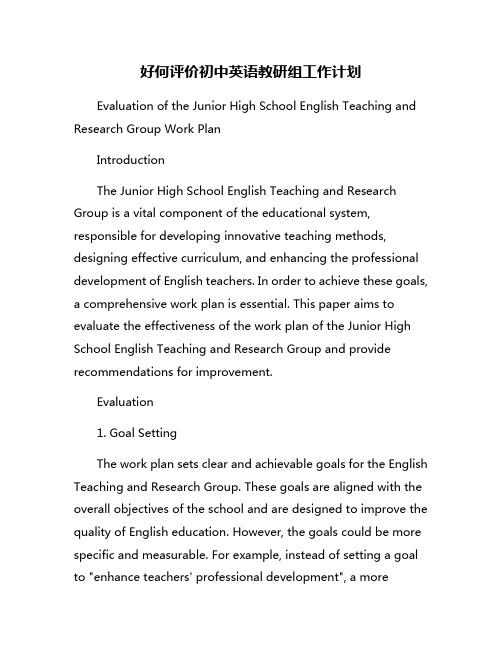
好何评价初中英语教研组工作计划Evaluation of the Junior High School English Teaching and Research Group Work PlanIntroductionThe Junior High School English Teaching and Research Group is a vital component of the educational system, responsible for developing innovative teaching methods, designing effective curriculum, and enhancing the professional development of English teachers. In order to achieve these goals, a comprehensive work plan is essential. This paper aims to evaluate the effectiveness of the work plan of the Junior High School English Teaching and Research Group and provide recommendations for improvement.Evaluation1. Goal SettingThe work plan sets clear and achievable goals for the English Teaching and Research Group. These goals are aligned with the overall objectives of the school and are designed to improve the quality of English education. However, the goals could be more specific and measurable. For example, instead of setting a goal to "enhance teachers' professional development", a moremeasurable goal could be "increase the number of teachers attending professional development workshops by 20% within the next year".2. Curriculum DevelopmentThe work plan includes activities for curriculum development, such as reviewing and updating the curriculum based on the latest educational trends and standards. This is crucial for ensuring that students receive a quality education that prepares them for the challenges of the 21st century. However, the work plan could include more opportunities for teachers to collaborate and share best practices in curriculum development.3. Teacher TrainingThe work plan includes provisions for teacher training, such as organizing workshops and seminars on innovative teaching methods. This is essential for improving teacher effectiveness and student learning outcomes. However, the work plan could be more comprehensive by including a wider range of training opportunities, such as online courses and peer mentoring programs.4. Assessment and EvaluationThe work plan includes activities for assessing and evaluating the effectiveness of teaching methods and curriculum design. This is important for identifying areas for improvement and ensuring that students are receiving a quality education. However, the work plan could include more frequent and systematic assessments to track progress over time.Recommendations for Improvement1. Set Specific and Measurable Goals: The English Teaching and Research Group should set specific and measurable goals that are aligned with the school's objectives. This will help track progress and ensure that the group is making meaningful contributions to English education.2. Enhance Collaboration: The work plan should include more opportunities for teachers to collaborate and share best practices in curriculum development and teaching methods. This will help foster a culture of continuous improvement and innovation.3. Expand Training Opportunities: The work plan should include a wider range of training opportunities for teachers, such as online courses and peer mentoring programs. This will help teachers develop their skills and stay current with the latest educational trends.4. Implement Regular Assessments: The work plan should include more frequent and systematic assessments to track progress and identify areas for improvement. This will ensure that the group is achieving its goals and making a positive impact on English education.ConclusionOverall, the work plan of the Junior High School English Teaching and Research Group is effective in setting goals and providing opportunities for curriculum development, teacher training, and assessment. However, there is room for improvement in terms of goal setting, collaboration, training opportunities, and assessment. By implementing the recommendations outlined in this evaluation, the English Teaching and Research Group can further enhance the quality of English education and contribute to the success of students.。
英语教研机制实施方案模板
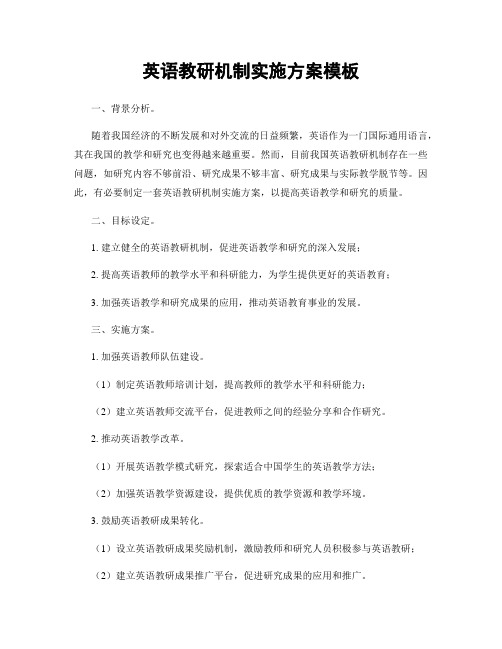
英语教研机制实施方案模板一、背景分析。
随着我国经济的不断发展和对外交流的日益频繁,英语作为一门国际通用语言,其在我国的教学和研究也变得越来越重要。
然而,目前我国英语教研机制存在一些问题,如研究内容不够前沿、研究成果不够丰富、研究成果与实际教学脱节等。
因此,有必要制定一套英语教研机制实施方案,以提高英语教学和研究的质量。
二、目标设定。
1. 建立健全的英语教研机制,促进英语教学和研究的深入发展;2. 提高英语教师的教学水平和科研能力,为学生提供更好的英语教育;3. 加强英语教学和研究成果的应用,推动英语教育事业的发展。
三、实施方案。
1. 加强英语教师队伍建设。
(1)制定英语教师培训计划,提高教师的教学水平和科研能力;(2)建立英语教师交流平台,促进教师之间的经验分享和合作研究。
2. 推动英语教学改革。
(1)开展英语教学模式研究,探索适合中国学生的英语教学方法;(2)加强英语教学资源建设,提供优质的教学资源和教学环境。
3. 鼓励英语教研成果转化。
(1)设立英语教研成果奖励机制,激励教师和研究人员积极参与英语教研;(2)建立英语教研成果推广平台,促进研究成果的应用和推广。
四、实施步骤。
1. 制定英语教研机制实施方案。
(1)成立英语教研机制实施方案编制小组,明确工作任务和时间节点;(2)调研国内外英语教研机制的最新发展,制定符合我国国情的实施方案。
2. 推广英语教研机制实施方案。
(1)组织英语教研机制实施方案宣讲会,向广大教师和研究人员介绍方案内容;(2)邀请专家学者对方案进行评审,不断完善和提升方案的可行性和实用性。
3. 落实英语教研机制实施方案。
(1)建立英语教研机制实施方案的监督评估机制,及时发现和解决实施中的问题;(2)总结和推广实施方案的成功经验,为其他学科的教研机制建设提供借鉴。
五、预期效果。
1. 英语教师队伍建设取得实质性进展,教师的教学水平和科研能力得到提升;2. 英语教学改革取得明显成效,学生的英语学习兴趣和能力得到提高;3. 英语教研成果得到更好的应用和推广,为我国英语教育事业的发展注入新的活力。
英语老师教研部门评价

英语老师教研部门评价背景作为学校的核心课程之一,英语在学生的日常学习生活中起着至关重要的作用。
如何提高英语课程的教学质量,让学生更好地掌握英语语言和知识,是英语教学中不可忽视的重要问题。
为此,学校设立了英语教研部门,旨在通过集体教研、经验分享等方式提升英语教育质量。
然而,英语老师教研部门是否达到了预期目标,是否能够真正提高英语教学质量,仍然需要客观评价。
评价内容为了客观评价英语老师教研部门的实际效果,我们从以下几个方面进行评价。
教研活动的有效性首先需要评价英语教研部门组织的各项教研活动是否充分有效。
这包括教研会、研修班、调研等等。
相比于单纯的照搬教材和公式化的复制,教研活动更具有创意和针对性。
通过教研活动,英语老师可以相互交流经验和教学感悟,吸收其他同事的优点,找到自身的不足。
如果教研活动能够有效地推动英语课程的质量提升,那么英语老师教研部门的实际效果就很可观。
教学效果的提升情况其次要评估的是英语教学效果的提升情况。
这是评价最具体、最直观的方法。
我们可以从教育局的考试数据和学生的考试成绩入手,进行统计和分析。
英语老师教研部门是否能够帮助教师们提高自己的英语教学水平和教学效果,最终达到提高教育质量的目的。
学生和家长的评价最后,我们需要了解的是学生和家长的评价。
学生和家长在英语课程中扮演着非常重要的角色。
学生是课堂教学的主角,他们的学习成果是英语教学效果的直接体现。
家长则是学生的监护人,在学生学习和生活中有着不可替代的作用。
通过收集学生和家长的评价,我们可以了解教师对英语课程的帮助程度、对学生和家长的影响程度,从而了解英语教研部门是否在弥补英语教学上的不足。
评价结果根据以上评价内容,我们得出的评价结果如下:•教研活动的有效性:英语教研部门的活动较为频繁,但是带来的实际收益较为有限,缺少足够的明确的教学目标和对目标的评估。
•教学效果的提升情况:整体而言,英语教学质量已经有所提升。
但是个别教师仍然存在许多问题,例如教学方法不够灵活,难以引起学生的兴趣等等。
英语教研活动评课流程稿范文大全

英语教研活动评课流程稿范文大全English: English teaching and research activities are an important part of professional development for educators.Chinese: 英语教研活动是教育工作者职业发展的重要组成部分。
English: These activities typically involve teachers showcasing their lesson plans and teaching methods for evaluation and feedback from colleagues.Chinese: 这些活动通常涉及教师展示他们的课程计划和教学方法,以获得同事的评估和反馈。
English: The process of evaluating lessons during these activities allows teachers to reflect on their own practices and learn from each other's successes and challenges.Chinese: 在这些活动中评估课程的过程让教师反思自己的实践,并从彼此的成功和挑战中学习。
English: One important aspect of the evaluation process is providing constructive feedback that focuses on strengths as well as areas for improvement.Chinese: 评估过程中的一个重要方面是提供注重优点以及改进领域的建设性反馈。
English: Through peer evaluation and collaboration, teachers can refine their teaching techniques and strategies to better meet the needs of their students.Chinese: 通过同行评估和合作,教师可以改进他们的教学技巧和策略,以更好地满足学生的需求。
初中英语有效课堂教学评价研究策略
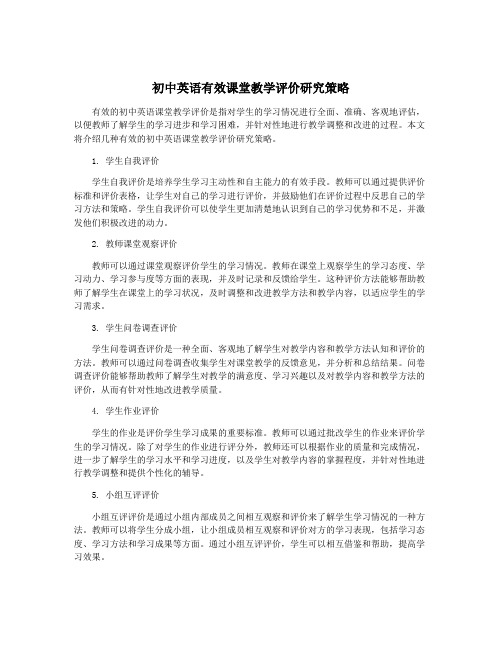
初中英语有效课堂教学评价研究策略有效的初中英语课堂教学评价是指对学生的学习情况进行全面、准确、客观地评估,以便教师了解学生的学习进步和学习困难,并针对性地进行教学调整和改进的过程。
本文将介绍几种有效的初中英语课堂教学评价研究策略。
1. 学生自我评价学生自我评价是培养学生学习主动性和自主能力的有效手段。
教师可以通过提供评价标准和评价表格,让学生对自己的学习进行评价,并鼓励他们在评价过程中反思自己的学习方法和策略。
学生自我评价可以使学生更加清楚地认识到自己的学习优势和不足,并激发他们积极改进的动力。
2. 教师课堂观察评价教师可以通过课堂观察评价学生的学习情况。
教师在课堂上观察学生的学习态度、学习动力、学习参与度等方面的表现,并及时记录和反馈给学生。
这种评价方法能够帮助教师了解学生在课堂上的学习状况,及时调整和改进教学方法和教学内容,以适应学生的学习需求。
3. 学生问卷调查评价学生问卷调查评价是一种全面、客观地了解学生对教学内容和教学方法认知和评价的方法。
教师可以通过问卷调查收集学生对课堂教学的反馈意见,并分析和总结结果。
问卷调查评价能够帮助教师了解学生对教学的满意度、学习兴趣以及对教学内容和教学方法的评价,从而有针对性地改进教学质量。
4. 学生作业评价学生的作业是评价学生学习成果的重要标准。
教师可以通过批改学生的作业来评价学生的学习情况。
除了对学生的作业进行评分外,教师还可以根据作业的质量和完成情况,进一步了解学生的学习水平和学习进度,以及学生对教学内容的掌握程度,并针对性地进行教学调整和提供个性化的辅导。
5. 小组互评评价小组互评评价是通过小组内部成员之间相互观察和评价来了解学生学习情况的一种方法。
教师可以将学生分成小组,让小组成员相互观察和评价对方的学习表现,包括学习态度、学习方法和学习成果等方面。
通过小组互评评价,学生可以相互借鉴和帮助,提高学习效果。
初中英语课堂教学评价是促进学生学习进步和教学效果提高的重要环节。
对英语教研活动的建议(3篇)

第1篇随着我国教育事业的不断发展,英语作为一门国际通用语言,其重要性日益凸显。
为了提高英语教学质量,激发学生的学习兴趣,培养具备国际视野的人才,英语教研活动显得尤为重要。
以下是一些建议,旨在为英语教研活动提供有益的指导。
一、明确教研目标1. 提高教师教学水平:通过教研活动,使教师掌握最新的英语教学理念、教学方法和技术,提高自身教学能力。
2. 优化教学资源:整合校内外优质教学资源,为教师和学生提供丰富的学习材料。
3. 促进学生全面发展:关注学生英语学习兴趣的培养,提高学生英语听说读写能力,培养学生的跨文化交际能力。
4. 增强团队凝聚力:通过教研活动,增进教师之间的沟通与协作,形成良好的教研氛围。
二、丰富教研内容1. 教学理论学习:组织教师学习国内外先进的英语教学理论,如交际法、任务型教学法、合作学习法等。
2. 教学方法研究:针对不同年级、不同层次的学生,探讨适合的教学方法,如情景教学法、游戏教学法、案例教学法等。
3. 教学评价研究:研究如何科学、合理地评价学生的英语学习成果,关注学生个体差异,实施差异化教学。
4. 教学反思与改进:鼓励教师进行教学反思,总结教学经验,不断改进教学方法。
5. 教学资源共享:搭建资源共享平台,鼓励教师分享优质教学资源,促进共同成长。
三、创新教研形式1. 举办专题讲座:邀请知名英语教育专家、学者进行专题讲座,拓宽教师视野。
2. 开展教学观摩活动:组织教师观摩优秀课例,学习先进的教学经验。
3. 举办教学研讨会:针对某一教学问题,组织教师进行研讨,共同探讨解决方案。
4. 实施教学比赛:举办英语教学比赛,激发教师教学热情,促进教师专业成长。
5. 建立教研小组:根据教师专业特长和教学需求,组建教研小组,开展针对性的教研活动。
四、加强教研管理1. 建立健全教研制度:明确教研活动的时间、内容、形式和考核标准,确保教研活动有序开展。
2. 加强教研团队建设:选拔优秀教研组长,培养教研骨干,提高教研团队的整体素质。
初中英语教研成果评估及优化方案探讨
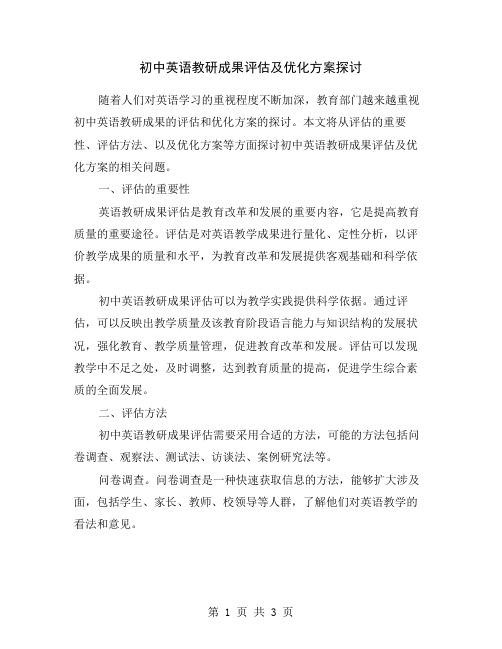
初中英语教研成果评估及优化方案探讨随着人们对英语学习的重视程度不断加深,教育部门越来越重视初中英语教研成果的评估和优化方案的探讨。
本文将从评估的重要性、评估方法、以及优化方案等方面探讨初中英语教研成果评估及优化方案的相关问题。
一、评估的重要性英语教研成果评估是教育改革和发展的重要内容,它是提高教育质量的重要途径。
评估是对英语教学成果进行量化、定性分析,以评价教学成果的质量和水平,为教育改革和发展提供客观基础和科学依据。
初中英语教研成果评估可以为教学实践提供科学依据。
通过评估,可以反映出教学质量及该教育阶段语言能力与知识结构的发展状况,强化教育、教学质量管理,促进教育改革和发展。
评估可以发现教学中不足之处,及时调整,达到教育质量的提高,促进学生综合素质的全面发展。
二、评估方法初中英语教研成果评估需要采用合适的方法,可能的方法包括问卷调查、观察法、测试法、访谈法、案例研究法等。
问卷调查。
问卷调查是一种快速获取信息的方法,能够扩大涉及面,包括学生、家长、教师、校领导等人群,了解他们对英语教学的看法和意见。
观察法。
观察法可以是对课堂教学的实时观察和记录,也可以是回顾性观察和记录。
教师可以检查知识点掌握的多少,语言表达能力,学习态度,等等。
测试法。
测试法旨在评估学生的英语知识水平和能力。
测试包括笔试、口试和听力等方式,是评估英语教育效果最直观最清晰的方法。
访谈法。
访谈法可以在个别或小组面对面的情况下进行,了解学生对英语学习的看法和体验。
它是一种富有参与性的方法。
案例研究法。
案例研究法是把一定的课程单元或重点知识点作为研究对象,通过收集、整理和分析大量相关资料的方法,评估英语教学成果的有效性和质量。
三、优化方案为了优化初中英语教学质量,教学管理应该采取以下几个方面的措施。
加强师生互动。
教师应该与学生建立良好的关系,鼓励和引导学生发表自己的观点和见解,这有助于学生对英语学习的主动性和积极性,使教育成为一种生动和丰富的体验。
英语教研展评活动方案(3篇)
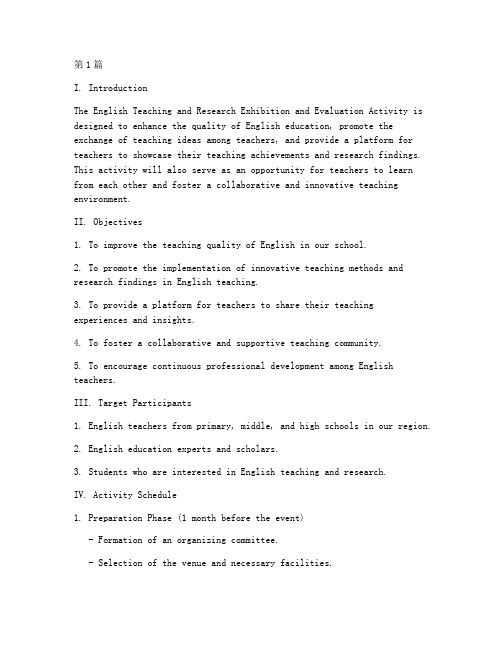
第1篇I. IntroductionThe English Teaching and Research Exhibition and Evaluation Activity is designed to enhance the quality of English education, promote the exchange of teaching ideas among teachers, and provide a platform for teachers to showcase their teaching achievements and research findings. This activity will also serve as an opportunity for teachers to learn from each other and foster a collaborative and innovative teaching environment.II. Objectives1. To improve the teaching quality of English in our school.2. To promote the implementation of innovative teaching methods and research findings in English teaching.3. To provide a platform for teachers to share their teaching experiences and insights.4. To foster a collaborative and supportive teaching community.5. To encourage continuous professional development among English teachers.III. Target Participants1. English teachers from primary, middle, and high schools in our region.2. English education experts and scholars.3. Students who are interested in English teaching and research.IV. Activity Schedule1. Preparation Phase (1 month before the event)- Formation of an organizing committee.- Selection of the venue and necessary facilities.- Announcement of the event to potential participants.- Distribution of registration forms and guidelines.- Collection of proposals for presentations and workshops.2. Pre-event Workshops (2 weeks before the event)- Training sessions for presenters and participants.- Technical assistance for presentation equipment.- Briefing sessions for participants on the event structure and schedule.3. Main Event (1 day)- Opening ceremony with a welcome address and keynote speech.- Parallel sessions for presentations and workshops.- Interactive sessions for participants to discuss and exchange ideas.- Evaluation and feedback sessions for presenters and participants.- Closing ceremony with a summary of the event and distribution of certificates.4. Post-event Phase- Compilation of the proceedings of the event.- Publication of a special issue of the school’s English education journal featuring presentations and research findings.- Follow-up activities to encourage continued collaboration among participants.V. Activity Structure1. Keynote Speeches- Invited experts and scholars will deliver keynote speeches on the latest trends and research findings in English education.2. Workshops- Hands-on workshops will be conducted to demonstrate innovative teaching methods and tools.3. Presentations- Participants will present their research findings, teaching experiences, and case studies.4. Interactive Sessions- Q&A sessions and group discussions will facilitate the exchange of ideas and feedback.5. Exhibition- An exhibition area will display teaching materials, resources, and educational technology.VI. Evaluation Criteria1. Content: The relevance, originality, and clarity of the presentations and workshops.2. Presentation Skills: The clarity, coherence, and engagement of the presenters.3. Interactive Participation: The level of interaction and engagement of the participants.4. Feedback and Impact: The feedback received from participants and the potential impact of the presented research and methods on English teaching.VII. BudgetThe budget for the English Teaching and Research Exhibition and Evaluation Activity will cover the following expenses:1. Venue rental.2. Equipment and materials.3. Catering and refreshments.4. Speaker and participant fees.5. Printing and publication costs.6. Miscellaneous expenses.VIII. ConclusionThe English Teaching and Research Exhibition and Evaluation Activity is a comprehensive initiative aimed at enhancing the quality of English education and fostering a culture of innovation and collaboration among teachers. By providing a platform for sharing knowledge and experiences, this event will contribute significantly to the professional development of English teachers and the overall improvement of English education in our region.第2篇I. IntroductionThe English Research and Teaching Exhibition and Appraisal Activity aims to provide a platform for English teachers to showcase their innovative teaching methods, research findings, and educational resources. This event will promote the exchange of ideas, foster professional growth, and enhance the quality of English education in our region. The activity will be held over two days and will include various sessions such as workshops, presentations, and panel discussions.II. Objectives1. To encourage teachers to engage in research and development of English teaching methods.2. To provide a platform for teachers to share their experiences and best practices in English teaching.3. To promote the use of modern educational technology in English classrooms.4. To enhance the professional development of English teachers through networking and collaboration.5. To evaluate and recognize the outstanding contributions of English teachers in our region.III. Target Participants1. English teachers from primary, secondary, and higher education institutions.2. English language educators and researchers.3. Educational administrators and policy-makers.4. Students and parents interested in English education.IV. Structure of the EventDay 1: Opening Ceremony and Keynote Speech1. Opening Ceremony (9:00 AM - 9:30 AM)- Welcome address by the organizing committee.- Introduction of the event's objectives and schedule.- Official opening of the exhibition and appraisal activity.2. Keynote Speech (9:30 AM - 10:30 AM)- A renowned English language educator or researcher will deliver a speech on the latest trends and challenges in English education.Day 2: Workshops, Presentations, and Panel Discussions1. Workshops (10:30 AM - 12:30 PM)- Interactive workshops on various topics such as flipped classroom, project-based learning, and the use of technology in English teaching.2. Presentations (1:30 PM - 4:30 PM)- Individual or group presentations on research findings, teaching methods, and educational resources.3. Panel Discussions (5:00 PM - 6:30 PM)- Moderated discussions on specific themes, such as the role of English in global communication, the challenges of bilingual education, and the future of English language teaching.V. Evaluation and Recognition1. Evaluation Criteria for Presentations:- Clarity and relevance of the topic.- Innovation and originality of the research or teaching method.- Effectiveness of the presentation in conveying the message.- Quality of the supporting materials and resources.2. Awards:- Best Research Presentation.- Best Teaching Method Presentation.- Best Innovative Resource.3. Certificates:- All participants will receive a participation certificate.- Winners of the awards will receive special certificates and recognition.VI. Logistics1. Venue:- The event will be held at a spacious and well-equipped conference center or educational institution.2. Date and Time:- The event will be held over two days, from 9:00 AM to 6:30 PM each day.3. Registration:- Online registration will be open two months prior to the event.- Participants will need to register and pay a registration fee to confirm their attendance.4. Funding:- The event will be funded through sponsorships, registration fees, and donations.VII. ConclusionThe English Research and Teaching Exhibition and Appraisal Activity is a significant event that aims to contribute to the continuous improvement of English education. By providing a platform for teachers to sharetheir knowledge and experiences, this event will foster a culture of innovation and excellence in English teaching and research. We look forward to the participation of all stakeholders in making this event a success.---This plan is designed to be comprehensive, covering all aspects of the event from the initial objectives to the logistics of the event. Adjustments can be made based on the specific needs and resources available to the organizing committee.第3篇I. IntroductionThe English Teaching and Research Exhibition Evaluation Activity aims to promote the development of English teaching and research in our educational institution. This event will provide a platform for teachers to showcase their innovative teaching methods, research findings, and educational resources. It will also serve as an opportunity foreducators to learn from each other, exchange ideas, and enhance their professional growth. The following is a detailed plan for the activity.II. Objectives1. To encourage teachers to engage in research and innovation in English teaching.2. To provide a platform for teachers to share their teaching experiences and best practices.3. To foster a collaborative and supportive learning environment among teachers.4. To improve the overall quality of English education in our institution.III. Target Audience1. English teachers from primary, secondary, and higher education levels.2. Educational administrators and researchers interested in English education.3. Students who wish to gain insights into effective English teaching methods.IV. Activity Schedule1. Preparation Phase (1 month before the event)- Formation of an organizing committee.- Distribution of the call for proposals to all interested teachers.- Setting up evaluation criteria and selection process.2. Submission Phase (1 month)- Teachers submit their proposals for teaching demonstrations, research papers, or educational resources.- Organizing committee reviews and selects the entries for the exhibition.3. Exhibition Phase (2 days)- Opening ceremony with speeches from educational leaders and keynotes on current trends in English education.- Parallel sessions for different categories (teaching demonstrations, research presentations, resource showcases).- Interactive workshops and panel discussions.4. Evaluation Phase (1 day)- Participants evaluate the entries based on the established criteria.- Award ceremonies for outstanding contributions.5. Post-Event Phase- Compilation of a report summarizing the event and its outcomes.- Dissemination of the findings and best practices to the wider educational community.V. Activity Structure1. Opening Ceremony- Welcome speeches by the institution’s leaders.- Introduction of the event objectives and schedule.- Keynote speeches on the current state and future trends of English education.2. Teaching Demonstration Sessions- Short presentations (15-20 minutes) showcasing innovative teaching methods.- Teachers will be judged based on the effectiveness of their teaching strategies, engagement of the audience, and the demonstration of learning outcomes.3. Research Paper Presentations- Research papers on various aspects of English education will be presented.- Presenters will be evaluated on the originality of their research, the clarity of their presentation, and the potential impact of their findings.4. Educational Resource Showcases- Display of educational resources such as textbooks, multimedia materials, and online platforms.- Participants will be judged on the effectiveness and originality of their resources.5. Interactive Workshops- Hands-on workshops where participants can engage in practical activities and learn new teaching techniques.- Facilitators will be selected based on their expertise and ability to facilitate interactive learning.6. Panel Discussions- Expert panels discussing current issues in English education, such as technology integration, assessment methods, and student engagement.VI. Evaluation Criteria1. Teaching Demonstration Sessions- Clarity and coherence of the lesson plan.- Engagement and interaction with the audience.- Innovation and creativity in teaching methods.- Effectiveness in achieving learning outcomes.2. Research Paper Presentations- Originality and significance of the research.- Methodology and data analysis.- Clarity and coherence of the presentation.- Potential impact of the research on English education.3. Educational Resource Showcases- Originality and effectiveness of the resource.- User-friendliness and accessibility.- Relevance to the English language curriculum.- Innovation in design and delivery.VII. Awards1. Best Teaching Demonstration2. Best Research Paper3. Best Educational Resource4. Best Interactive Workshop5. Overall Excellence AwardVIII. Budget1. Venue rental2. Printing of materials (brochures, programs, evaluation forms)3. Catering for participants4. Prizes for winners5. Honorarium for speakers and judges6. Miscellaneous expensesIX. ConclusionThe English Teaching and Research Exhibition Evaluation Activity is a valuable opportunity for educators to come together, share their knowledge, and inspire each other. By following this comprehensive plan, we aim to create a memorable and impactful event that will contribute to the ongoing development of English education in our institution.。
小学英语学科教研评价方案

附件六:双线推进整体教学打造持续发展力小学英语学科教研评价方案一、指导思想根据国家有关教育的法律法规和学校分科教学改革的指导思想,为了更好地调动中小学广大教师在分科教改中的工作积极性和创造性,将教研工作落到实处,全面提高教育教学质量,特制定本方案。
二、项目与权重总分100分。
教改态度10分;教改材料20分;集体备课10分;新理念课堂研究、落实40分;课题研究20分;附加分若干。
三、检评细则(一)教改态度(10分)1.工作纪律(5分)学科教研培训会、学科组组织的公开课听评、集体教研等各种教研活动,早退、迟到、病假扣1分,事假扣2分、无故旷会不参加的每次扣5分,因公请假的不扣分。
学科组会议、集体备课等教研活动,由相关召集人进行考勤并做好记录。
2.理念跟进(5分)(1)要求:作为英语教师,在英语教研活动中,积极参与教研,教学理念跟进及时、到位,课堂教学渗透新理念、教学反思贯彻新思想、备课说课重视教学衔接。
具体按如下标准衡量教师的教改态度:(1)赋分方法:根据教研整个过程中教师理念的跟进情况,按以下等级赋分,A等理念积极主动跟进5分;B等是理念及时跟进4分;C等是理念被动跟进1—3分。
(二)教改材料(20分)1、材料上交(5分)对分科教改活动中布置的各种材料,材料主要包括教改诊断反思、会议记录、教研记录、评课稿、集体备课稿、说课稿、电子教案等应按时上交,凡迟交者降级赋分,不交者按0分计。
赋分方法:根据教师材料的上交情况可以分为三等:A等5分,B等4分,C等3分。
2、教改材料(15分)赋分方法:根据所写材料质量分别赋分,A等15分,B等13分,C等11分。
(三)集体备课(10 分)1.要求:教师按要求认真参加学科组开展集体备课。
备课组长安排集体备课时间、地点,并根据教学进度提前安排主备人写出集体备课稿,材料书写规范、认真、项目全,记录详实、突出教法学法研究(该过程有专人检查督导,确保该项活动落到实处)。
2.检查方式:在分科教研会期间或平时检查集体备课的开展过程和质量。
- 1、下载文档前请自行甄别文档内容的完整性,平台不提供额外的编辑、内容补充、找答案等附加服务。
- 2、"仅部分预览"的文档,不可在线预览部分如存在完整性等问题,可反馈申请退款(可完整预览的文档不适用该条件!)。
- 3、如文档侵犯您的权益,请联系客服反馈,我们会尽快为您处理(人工客服工作时间:9:00-18:30)。
诸城市龙源学校小学英语学科
为落实市教研室小学教学质量评价方法的实施方案新的一年已经开始,为了能从根本上全面提高龙源学校小学的英语教学水平,进一步培养学生的英语综合素质,充分体现龙源小学的办学特色,根据2005年教研室制定的《诸城市小学教学质量评价办法》,特制定以下实施方案:
一、坚持兴趣第一原则,营造良好的英语氛围。
兴趣是最好的老师。
小学生学习英语的成功,在很大程度上取决于他们的学习兴趣。
因此,我们应当注意激发学生学习英语的强烈愿望,使他们乐于学;而学习兴趣的保持在很大程度上取决于学习的效果,取决于他们能否获得成就感。
我们要通过多种激励的方式,鼓励学生积极参与学习活动,大胆实践,体验成功。
学生有了学习的成就感,就有了学习的信心。
同时,小学英语教学要特别强调语言环境的创设,我们会充分利用和开发多种媒体(如电视、录音、光盘等)进行教学,从而丰富教学内容,活跃课堂气氛,创设生动、真实的语言环境。
另外,还应注重创设校园英语角、英语广播、英语文体活动等形式的课外英语环境。
二、遵循语言学习规律,优化课堂教学。
1、根据小学生年龄和心理的特点,小学英语教学要创建以活动课为主的教学模式。
我们的教学重点是培养学生用语言进行交流的能力。
我们会充分利用教学资源,采用听、做、说、唱、玩、演的方式,鼓励学生积极参与,大胆表达,侧重提高小学生对语言的感受和初步用英语进行听、说、唱、演的能力。
小学五、六年级的英语教学,我们会在进一步加强学生听说能力的同时,发展初步的读写能力,为进
一步学习打好基础。
2、课堂教学应以话题为核心,以功能和结构为主线,以任务型活动为目标安排各模块的教学,让学生接触足够量的语言材料,保证输入量,“习得”与“学得”结合,使学生逐步培养起初步的语感,形成良好的语音、语调、书写和拼读的习惯。
三、创新教学方法,激发学生学习兴趣。
1、努力做到兼收并蓄、集各家所长,采用综合的教学方法。
情景法、视听法、直接法、结构法、交际法、全身反应法等,只要有助于实现教学目标,我们都会积极采纳。
2、积极创设情景、相互交流、启发学习动机,树立学生学习英语的信心。
我们要充分利用教科书中的课文创设栩栩如生的情景,如打电话、购物、生日聚会、野餐、旅游、问路、看病等,为学生提供使用英语进行交流的机会,增强学习英语的兴趣、信心,激励学习的动机和情感。
3、充分调动学生多种感官的参与。
手、脑、口、耳、眼、肢体并用,静态、动态结合,基本功操练与自由练习结合,单项和综合练习结合。
通过大量的语言实践,使学生具有良好的语音、语调、书写和拼读的基础,并能用英语表情达意,开展简单的交流活动。
4、集思广益,设计任务型活动,开放空间,激活学生的思维,培养创造思维。
要通过适合儿童年龄、心理和生理特点的生动活泼的课堂活动,把学习英语和用英语做事情结合起来,创设良好的语言环境和语用环境,使学生在愉快和自信的情绪中,保持积极的学习态度,在大量的语言实践中形成语感,养成良好的学习习惯,为进一步学习英语打好基础。
四、灵活组织课堂,充分调动学生的积极性。
1、短时间、高频率,保证学生多次接触英语和足够的实践量。
目前,由于小学英语课每周仅有3-4课时,为保证让学生多一些接触英语的机会,较理想的做法是在可能的情况下上小班课,以20-30人为宜,这样可以更好的发挥效益,加大每个学生的实践量。
2、开展两人小组、多人小组、成行、成排等多种形式的活动。
这是小学英语教学的重要特点之一。
只有开展这些活动才能使每一个学生充分的参与课堂实践,才能体现语言的交际性,才能实现师生之间的互动。
3、课堂上课桌椅的摆放形式根据教学的需要采用不同的方式-----秧田式、半圆式、全圆式、双圆式等,目的是为了更好的开展各种教学活动。
这样做不仅可以促进师生之间的情感交流,而且可以培养学生互相关心、合作的团队精神。
五、采用现代化教学手段,优化教学过程。
在新的一年中,我们将最大限度的采用现代化教学手段,服务于我们的课堂,优化教学过程,提高小学英语教学质量。
我们打算采取以下措施:
1、利用英语教学音像资源-----图画、图表、投影、录音、录像、CD、VCD等多媒体软件,不仅能为学生提供规范的语音、语调,还可以提供真实自然的语言使用的示范,即语言使用的场合、时间、对象等,而且还有体态语——手势、动作、表情等的示范。
2、多种多媒体的运用使教学变得生动、形象、活泼,感染力强,容易激发学生兴趣,引起有意注意,加深印象。
帮助学生持久记忆。
3、充分利用现代化教学手段,可以超越时间和空间的限制,使
学生置身于以英语为沐浴的环境中,体验英语的实际运用。
多媒体课件的使用可以使教学过程程序化,大大提高教学的效率,这一点对课时少的小学英语课尤为重要。
六、采用集体备课形式,集思广益;相互听课,取长补短
我们会分年级段进行集体备课,让全组的每个成员都有发言的机会,都有出谋划策的意识,积极参与,认真备课,真正做到不备课不上讲堂。
我们还会相互听课,取人之长,补己之短,认真进行听课、评课活动。
七、大胆开展英语教研工作
1、搞好研究课活动。
每位英语教师都必须确定好自己的研究课题,根据自己的课题选好课例准备好研究课。
每周我们力求听1-2节英语课,听1节研究课(服从教学处安排),每两周听一节观摩课(服从教学处安排)。
2、评课。
我们定于每周三下午为英语组活动日,我们会利用这段时间进行集体备课,对所听的研究课进行评课,评课时要求人人发言,并写出评课后的体会。
3、作业检查。
我们每月检查一次作业,重点检查作业次数是否合适、作业批改是否及时、认真等方面。
4、论文撰写。
我们将根据个人的课堂实录,每月每人写一篇英语论文。
八、积极开展英语活动
1、继续搞好英语角活动,填好活动记录。
2、进一步加强培优辅导,辅导教师应有明确的目标和辅导措施。
3、在加强培优的同时,别忘了班中英语较弱的学生,这是影响
我们成绩的至关重要的原因。
我们英语教研组全体成员会认真按以上方案进行教学、研究,不断创新,团结协作,力争为全面提高我校的英语教学水平而努力工作。
龙源学校小学英语教研组
2005-1-5。
